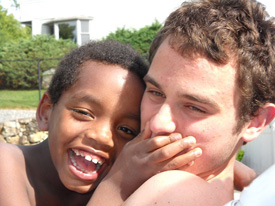
Daniel Rauchwerk had chosen the topic for his senior thesis: a comparative study of the food crises in Ethiopia, Zimbabwe, and Nigeria. But he aspired to more than an economic analysis.
“I wanted to capture the deep humanistic and emotional aspects of malnutrition and starvation in these countries,” says Rauchwerk, a business major with a minor in African studies.
So, as an accompaniment to his written work, he composed a CD of original music. The 10-song album took him three months to write. Rauchwerk sings and plays guitar on the recording, backed by his younger brother Noah on drums and vocals. Ranging from ballads to reggae to pop, the songs portray a mosaic of African history and culture.
“Each {song} presents the story of a person in crisis,” says Rauchwerk, who recently performed selected tunes for students and faculty as part of his Capstone project, a requirement of the honors program of the School of Arts and Sciences.

Rauchwerk sings track number two, for example, “King Selassie Come Let Me Down,” from the perspective of an Ethiopian citizen criticizing Haile Salassie - an emperor once extolled as the returned Messiah - for his neglect and cover up of the Ethiopian famine. (Selassie died in a suspected assassination in 1975.)
Another song, “No Country is Mine” captures the despair of the Ibo people of Biafra, which seceded from Nigeria during the late 1960s, sparking a war in which a million civilians died in fighting and from famine. The Republic of Biafra was eventually reabsorbed into Nigeria.
Creating a full-length album has been Rauchwerk’s dream since middle school, when he began singing in bands in his hometown of Holmdel. He and Noah, five years his junior, perform as an acoustic-rock duo, The Lords of Liechtenstein.
The creative material for a CD, however, didn’t present itself until his aunt adopted a 2-year-old boy from Ethiopia in 2006.
“My cousin Firew (pronounced like fray-oh) is the reason I began to study Africa,” Rauchwerk says. “He came here knowing words in two languages, Amharic and Sudamo. If he had to learn everything about our culture, I figured it was only fair that I learned about his.”
At Rutgers, Rauchwerk studied comparative African literature and African history, along with economics and marketing, transferring into the School of Business-Newark and New Brunswick his junior year.
“Business’s influence over the human psyche is fascinating,” he says. “But all of this power is useless unless it is applied for the betterment of mankind.”
His study of the economic causes of Africa’s famines is intertwined the country’s politics and people.
Rauchwerk hopes someday to work in nonprofit marketing -- for a human rights or environmental advocacy organization. But right now he’s thrilled to be starting a part-time job as a promotions assistant at WRXP, a rock station in New York, which will leave time for composing, performing, and marketing his Africa CD. The CD is available on his Band Camp website and all proceeds go to G-Roots, a Toronto-based nonprofit that is developing and implementing a seed loan program in northern Ghana.
The last track on the album, he says, sums up what the project is about for him. It’s called ‘I am Hungry’ – a mother’s prayer for her starving child. “Listen to my hunger song and sing it to the world,” she sings . . . begging the world to help her child even though it’s too late for her.
“That lyric,” says Rauchwerk, “is the message of my CD: to not let these people become more statistics in our history books.”


